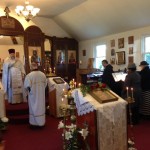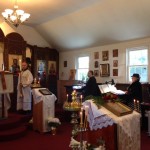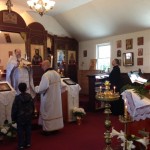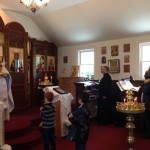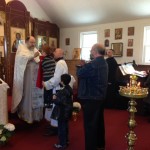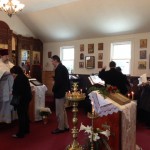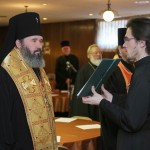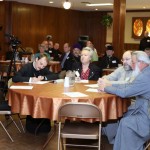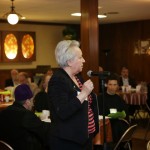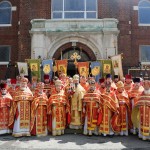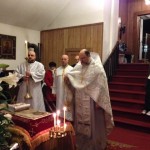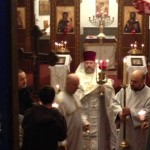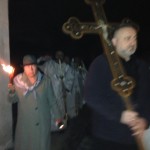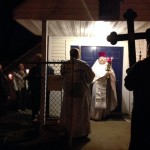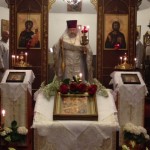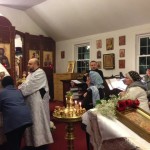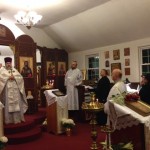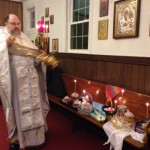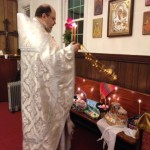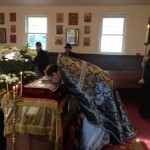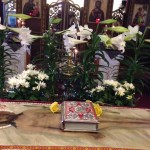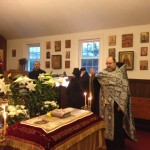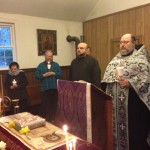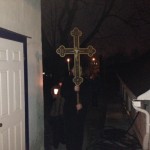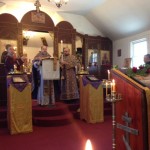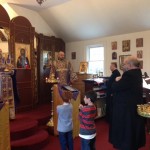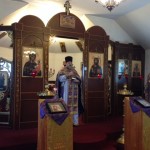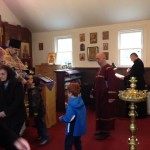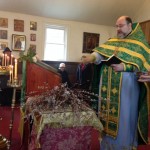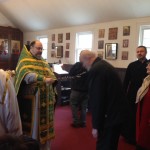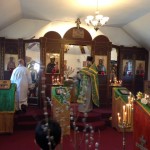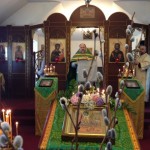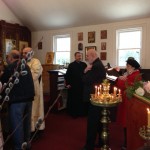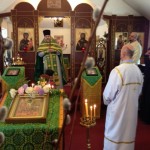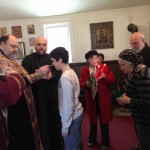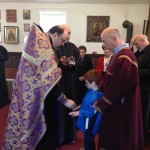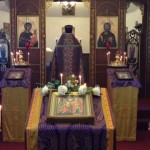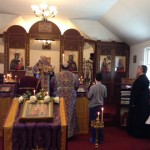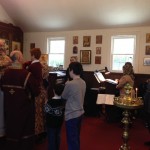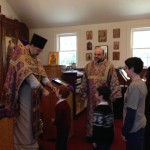On April 27, on Sunday of Antipascha, or Sunday of St. Thomas, the Rector of St. George’s Church celebrated the Divine Liturgy in our temple. After the Scripture readings he preached a homily:
“Beginning with the feast of Holy Pascha we start the Epistle readings from the book of the Acts of the Holy Apostles. In fact, the Church tradition tells us to read that book in the middle of the temple on Holy Saturday night, before we begin our Easter services. This book of the New Testament is placed in the Bible right after the four Gospels. It was written by the Holy Apostle and Evangelist Luke who wrote one of the four Gospels. The book’s very name indicates that it tells about the holy Apostles. It tells about their mission after our Lord Jesus Christ was risen from the dead and ascended into heaven. But why do we read it during Easter season when we celebrate the Resurrection of Christ? We do it because the message of the Acts of the Apostles is all about the outcome of the Lord’s Resurrection. The book of Acts is often called the Gospel of the Resurrection.”
“Today’s Epistle lesson from the book of Acts tells that the early Apostles were so filled with the power of the Holy Spirit that through their hands “many signs and wonders were done among the people” (Acts 5, 12). The Apostle Peter’s influence was so great that sick people were carried out and placed on the street, so “at least the shadow of Peter passing by might fall on some of them” and heal them (Acts 5, 15).”
“We have to say that everyone has a shadow. Everyone has an influence on others. It may be a good or a bad influence. The impact of our personality on another makes it either easier or harder for the person to live a good life. No one is neutral. We cannot escape from this any more than we can escape casting a shadow on a sunny day. It is either a shadow of healing or a shadow of harm. I read that the Greeks have a word “kaloiskiotos” meaning a person who has a good shadow, to describe a good person, a blessed one.”
“A director of nursing said once that when she trains nurses she says to them, “Be a nutritious person; don’t be a toxic person”. Some nurses in the hospitals are toxic people. Whenever they come close to a patient, they infect that person with the poison of fear, doubt and anxiety. But there are also “nutritious nurses”. The way they walk, touch, listen and talk, they build hope, put strength into a patient. They thus create an attitude in which God can perform a healing ministry.”
“We all cast a shadow in life. We affect the people we live with every time we are with them. We make others either more hopeful about themselves, or more discouraged. Holy Apostle Peter cast a shadow that healed. The person who stands with the light of Christ upon him will cast a shadow that has healing in it. The person who lives in Christ, as Peter did; who enters God’s presence through prayer every day and is filled with the Holy Spirit cannot but be a “nutritious” person whose shadow radiates to others with love, hope, peace, joy, and strength of Christ.”
“Dear brothers and sisters! Let us live under the light of our perfect Sun of Truth, our Lord Jesus Christ. This means to walk before the Lord fulfilling His Commandments, loving Him and our neighbor. This means to be filled with the divine grace, to be the partakers of His Holy Mysteries. This also means to live a life of prayer. Then our shadow may be blessed for those on whom it may be cast. The holy Fathers say that person who goes into perfume shop every day, even if he buys nothing, leaves the shop with a fragrance around him. The perfume shop is God’s presence which we may enter daily through prayer. Remember, as St. Paul says that through us God spreads “the fragrance of His knowledge in every place. For we are to God the fragrance of Christ among those who are being saved and among those who are perishing” (2 Cor. 2, 14-15). Let us be such a fragrance of Christ, let us cast a shadow from being under the light of the Risen Lord.”
After the dismissal of the Liturgy the Rector distributed the particles of the Artos blessed on Pascha. He also reminded parishioners that very soon, on May 6 our church will celebrate its Patronal fest, St. George’s Day. We should prepare for that feast, especially because His Eminence, Archbishop Justinian is going to visit our temple and head our festal service.

